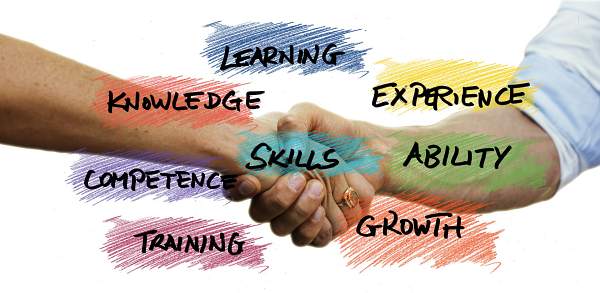6 Key Interpersonal Skills for Effective Teamwork
In the corporate world, developing interpersonal skills is critical, as it directs individuals to work well together and makes them more able to achieve great goals. Thus, an entrepreneur or manager with such skills should motivate, lead, facilitate, coordinate, communicate and solve problems.
In this article, we are going to discuss the top 6 Key Interpersonal Skills for Effective Teamwork.
- Self-knowledge
- Empathy
- Assertiveness
- Cordiality
- Ethics
- Leadership
We do not choose our colleagues, bosses, clients, and partners as we choose our friends, and even without affinity, we need to collaborate well when working with these ‘strange’ people.
At work, it is probably where we will spend most of our time, and live with people who are different from us, in terms of opinion, worldview, education, culture, behavior, etc.
Highly Recommended Next Articles:
3 Must-Have Interpersonal Skills for Managers
9 Great Ways to Improve Interpersonal Skills
Top 15 Interpersonal Skills for Customer Service
Top 6 Key Interpersonal Skills for Effective Teamwork
Interpersonal Skills for Teamwork: #1SELF-KNOWLEDGE
Recognizing traits of one’s behavior is essential in identifying how one’s actions will affect others and how others’ actions will affect them;
Teamwork requires the professional to know himself. One way to work on self-knowledge is to question oneself and understand the reasons that lead to inappropriate behavior.
It’s essential to ask:
- What do I see in other people that bother me?
- When a divergent opinion is called into question, what is my reaction?
- Why is it that in a particular situation I became angered?
In the work environment, self-knowledge allows us to realize that no one is better than anyone, that each person has their style and way of collaborating. Understanding our team, including their traits, helps managers allocate professionals to the roles they will perform best.

Interpersonal Skills for Teamwork: #2 EMPATHY
Putting ourselves in the other’s shoes, considering our opinions and motivations, makes us less selfish and amplifies our perception of reality;
The first step to arouse empathy is even to try to understand the position of the co-worker. Understand that each person has different emotions, feelings, and perspectives.
It is also worth considering that one of the critical points to establish more effective communication is the ability to become empathic. Such knowledge allows this interaction to be much more positive within the corporate environment.
It is crucial to take into consideration that:
- Adopting a posture of empathy is not giving up your worldview but accepting and understanding other ways of living;
- To accept the other’s way is not to agree with them, but to understand that, in the face of life experiences that they may have had, they were bound to act in the way that they did.
With empathy, you can understand the other’s paths, understand the reasons for worn shoes or not, and understand the emotions and feelings that the person experiences while walking in their way. You may even feel a similar sense, as it is not possible to be the other.
Related Article: Interpersonal Skills – How to Develop Empathy
Interpersonal Skills for Teamwork: #3 ASSERTIVENESS
Expressing ourselves straightforwardly and respectfully demonstrates clarity in your opinions, goals, and obstacles. As important as knowing how to listen, it’s also important to know how to speak;
Assertiveness not only brings benefits to:
- Both professional and personal life but also it provides well-being since the person tends to feel at the reins of life itself;
- Also, assertiveness diminishes the need for people to feel approved by others, as they are sure of their actions.
- This way, the person ends up becoming more confident and with balanced self-esteem.
Interpersonal Skills for Teamwork: #4 CORDIALITY
“Kindness generates kindness”; treating people well shows consideration and facilitates the formation of good relationships. Showing courtesy to others, our team, and everyone we have a relationship with is being cordial.
Cordiality is to thank someone for looking in the eyes, is to give that “good morning” when arriving at work, and is to open the door to a colleague who is with busy hands.
A team member at work who is cordial, in addition to being a customer loyalty building asset, can be an instrument for the propagation of the company’s good image.
A well-served customer has the power to recommend the service to their family, friends, and even strangers.
Interpersonal Skills for Teamwork: #5 ETHICS
Taking a stance that aims not to harm each other and maintain a sense of justice is essential in gaining people’s trust. For professionals, adopting an ethical stance at work is fundamental because this is a type of behavior valued in the market.
In this way, it is reinforcing a positive image of itself, which generates credibility and trust.
Ethics can also help in:
- Maintaining good professional relationships, since it respects others;
- Generating positive reflexes, both for the organization and for its employees, as it increases productivity, stimulates harmony in the work environment and helps the professional development of its members;
- Contributes to ensure the smooth running of activities and favor a healthy and harmonious organizational climate; thus, employees start to develop more trust among themselves, which helps increase productivity.
Interpersonal Skills for Teamwork: #6 LEADERSHIP
The leader is an essential part of the team because he/she is responsible for mediating between the led and the organization’s objectives. In this way, the leader’s main activity is the management of the work of the employees, to achieve goals, as well as optimize and streamline them.
Top 8 Interpersonal Qualities of Great Leaders
Leadership and teamwork are directly linked, where the leader is the professional and the central figure that leads employees in the work processes. Besides, today, he/she is responsible for developing professionals and teams to explore the maximum of their skills and knowledge.
Conclusion
Everyone within the team is responsible for their activities, that is, for the success of a task well done or unsuccessful action. The dedication and effort of each team member need to be directed towards a common goal.
Interpersonal Skills are critical at work, and one way it really helps businesses is by increasing teamwork efficiency and motivation when it’s formal and informal leaders possess the skill.
Reference and Further Reading
HOLT, Mitchell. Effective Teamwork & Interpersonal Skills. CHRON
SKILLS YOU NEED. Effective Team-Working Skill
GONZALEZ, Jennifer. The Cult of Pedagogy Podcast. Google Podcast
The Wabash Center’s Dialogue on Teaching. Google Podcast








